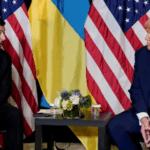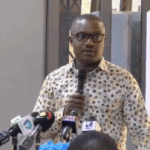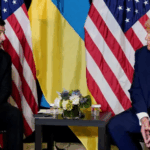
Ukrainian President Volodymyr Zelensky will meet with US President Donald Trump in Washington on Friday, as Trump weighs whether to arm Ukraine with Tomahawk missiles capable of striking deep into Russia.
Their meeting comes a day after Trump said “great progress” was made during a phone call with Russian President Vladimir Putin, with the pair agreeing to face-to-face talks in Hungary.
Trump said the call, the first with Putin since mid-August, was “very productive”, adding that teams from Washington and Moscow will meet next week.
As Zelensky arrived in the US, his third visit since January, he said Moscow was “rushing to resume dialogue as soon as it hears about Tomahawks”.
Zelensky has called on the US to provide Ukraine with the advanced missiles, which have a range of 2,500 km (1,500 miles).
Asked earlier this week if Trump was considering giving Ukraine Tomahawks, he said: “We’ll see… I may.”
But when asked about the same prospect following his call with Putin, Trump said “we can’t deplete” the US stockpile of Tomahawks, adding “we need them too… so I don’t know what we can do about that”.
Writing on his Truth Social platform after his call with Putin concluded, Trump said he and the Russian president “spent a great deal of time talking about Trade between Russia and the United States when the War with Ukraine is over”.
He said “high level advisors” from both countries would meet at an unspecified location next week, with Secretary of State Marco Rubio leading the American delegation.
Trump also said he would update Zelensky on his talks with Putin on Friday, adding: “I believe great progress was made with today’s telephone conversation.”
He later told reporters he expected to meet Putin in Hungary “within two weeks”.
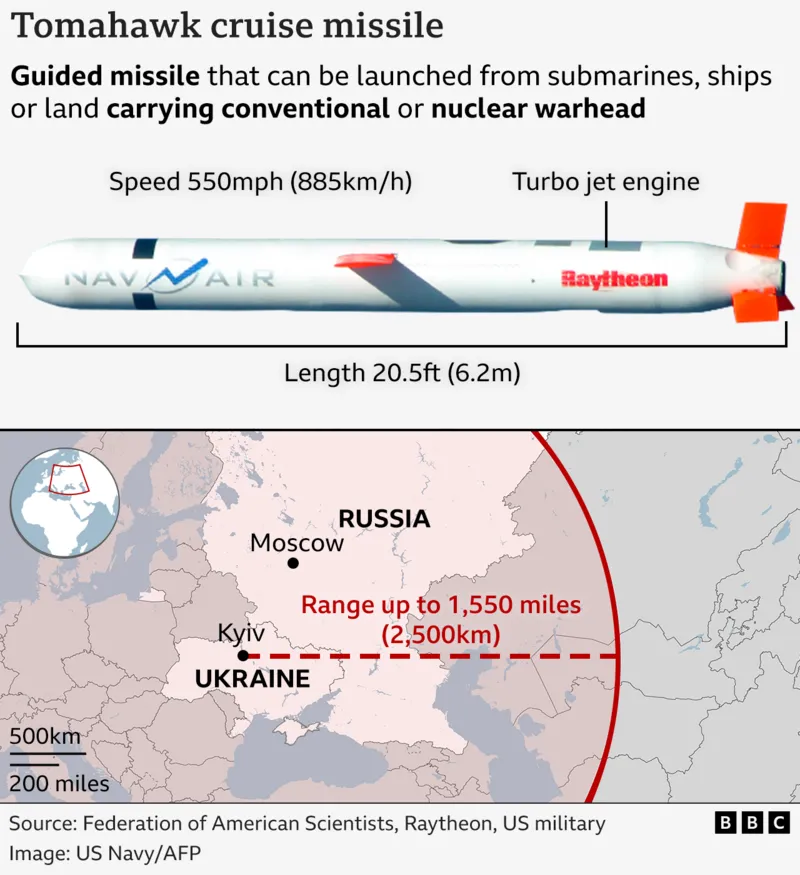
Trump has been seen as more sympathetic toward Russia than his predecessor Joe Biden, but in recent months has taken a stiffer line with Putin.
He had hoped a face-to-face summit in Alaska in August would help convince the Russian president to enter into comprehensive peace talks to end the war – but that meeting failed to produce a decisive breakthrough.
They spoke again days later when Trump interrupted a meeting with Zelensky and European leaders to call Putin.
Trump and Putin could have another talk a week after Rubio’s meeting with advisors, Hungary’s prime minister said.
Viktor Orban told state radio he would speak to the Russian president later on Friday.
“Since the EU is pro-war, it is logical that it will be left out of this peace process,” he said.
The planned meeting in Budapest was “great news for the peace-loving people of the world”, Orban wrote on X on Thursday, and he added that he had spoken to Trump by phone.
Earlier, he also said: “Peace requires patience, strength, and humility. Europe must shift its stance. Instead of arrogance and fanning the flames of endless war, we need negotiations with Russia. Only dialogue can bring peace to our continent.”
Hours before the Trump-Putin call, Russia launched one of its largest attacks of the year on Ukraine, including 28 ballistic missiles, and 320 drones, according to Ukraine’s ambassador to the US, Olga Stefanishyna.
Stefanishyna said Russia launching overnight strikes on Ukraine before the call “exposes Moscow’s real attitude toward peace”.
In a statement to the BBC’s US partner CBS, she added: “These assaults show that Moscow’s strategy is one of terror and exhaustion. The only effective response is pressure – through tougher sanctions, reinforced air defense, and the supply of long-range capabilities.”
Though Trump had indicated that he was considering sending long-range Tomahawk cruise missiles to Ukraine, he told reporters the US could not deplete its stockpile. “We need them too”, he said after Friday’s call with Putin.
Ukraine’s navy does not have the necessary ships to operate them, and the US has a small number of launchers needed for the missiles – typically mounted on ships and submarines.
In 2019, the US began reviving the Tomahawk land-based mobile launcher programme after the Intermediate-Range Nuclear Forces (INF) Treaty, which had banned this version, ceased to exist.
The new system is called Typhon, and it entered service with the US Army in 2023.
Currently, the US military has at least two Typhon launchers, but it is unlikely to have many more.
The possibility of the US sending Ukraine long-range Tomahawk cruise missiles would cause “extreme concern”, Kremlin spokesman Dmitry Peskov said on Sunday, adding such a move would be viewed in Russia as “a major escalation.”
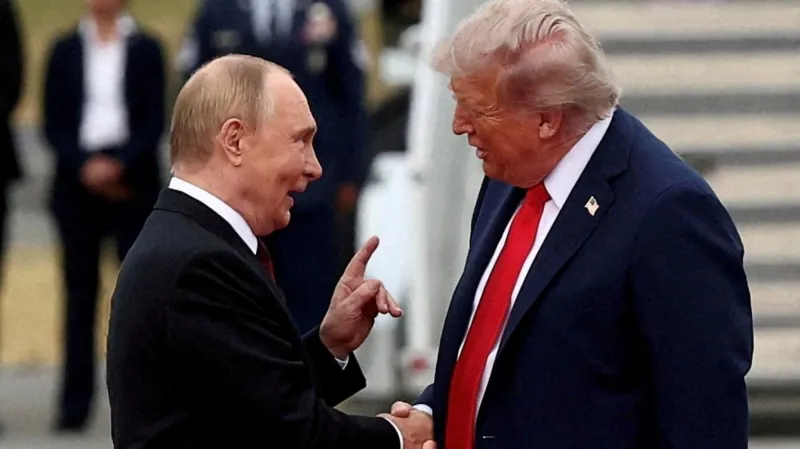
During his presidential election campaign, Trump claimed he would be able to end the war in Ukraine within days but has since admitted resolving the conflict has been more challenging than any he has been involved in since returning to power.
Trump’s strained relations with Zelensky came to a head on 28 February when he and Vice-President JD Vance berated the Ukrainian president in the Oval Office on live television.
But public relations with Zelensky have vastly improved in recent months.
In September, Trump signalled a major shift in his view of the conflict, saying he believed Kyiv could “win all of Ukraine back in its original form”, a far cry from his public calls for Kyiv to cede territory occupied by Russia.
In late July, Trump set Putin a deadline of less than a fortnight to agree to a ceasefire or face sweeping sanctions, including measures against countries which still trade with Russia.
But he did not follow through the threat after Putin agreed to meet Trump in Alaska, which the US president hailed as a significant diplomatic success at the time, despite it not producing any tangible outcome.
Earlier on Thursday, India’s foreign ministry cast doubt on a claim made by Trump a day earlier saying Indian Prime Minister Narendra Modi had agreed to stop purchasing Russian oil.
An Indian government spokesman said he was “not aware of any conversation between the two leaders” taking place the previous day, after Trump said Modi had assured him purchases would stop “within a short period of time”.
The US has pushed for countries – in particular India, China and Nato members – to stop buying Russian energy in an effort to increase economic pressure on the Kremlin. Zelensky has also repeatedly echoed those calls.
- President Commissions 36.5 Million Dollars Hospital In The Tain District
- You Will Not Go Free For Killing An Hard Working MP – Akufo-Addo To MP’s Killer
- I Will Lead You To Victory – Ato Forson Assures NDC Supporters
Visit Our Social Media for More

